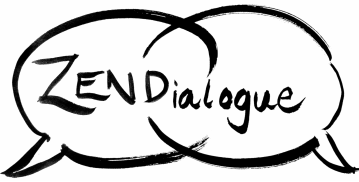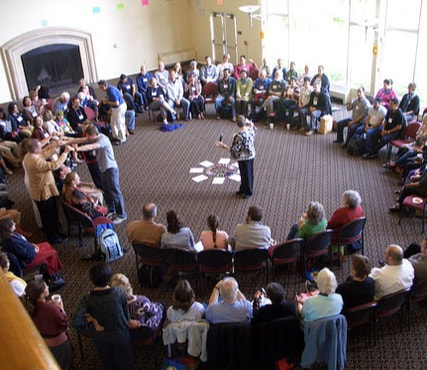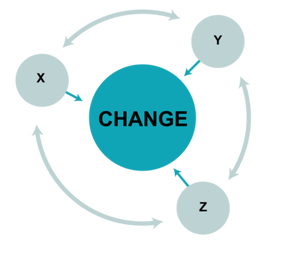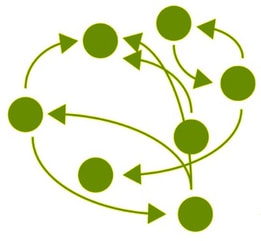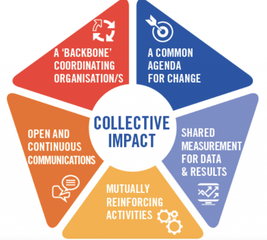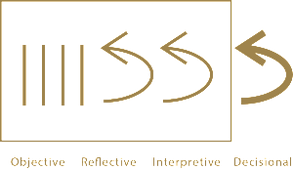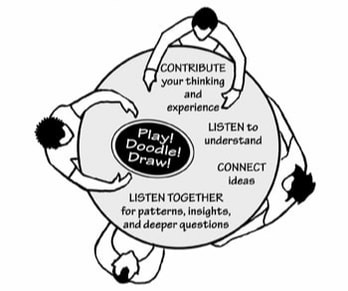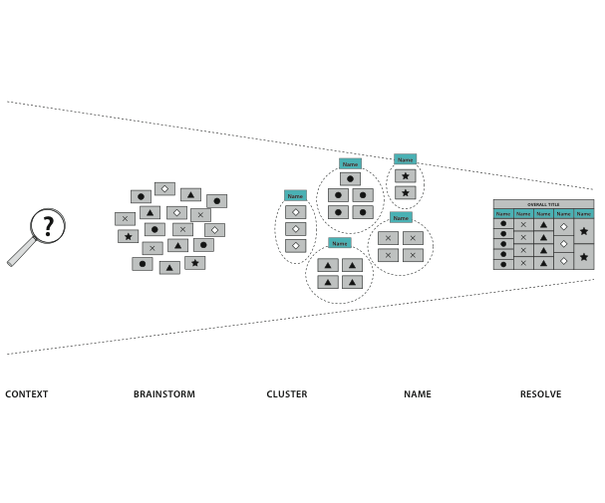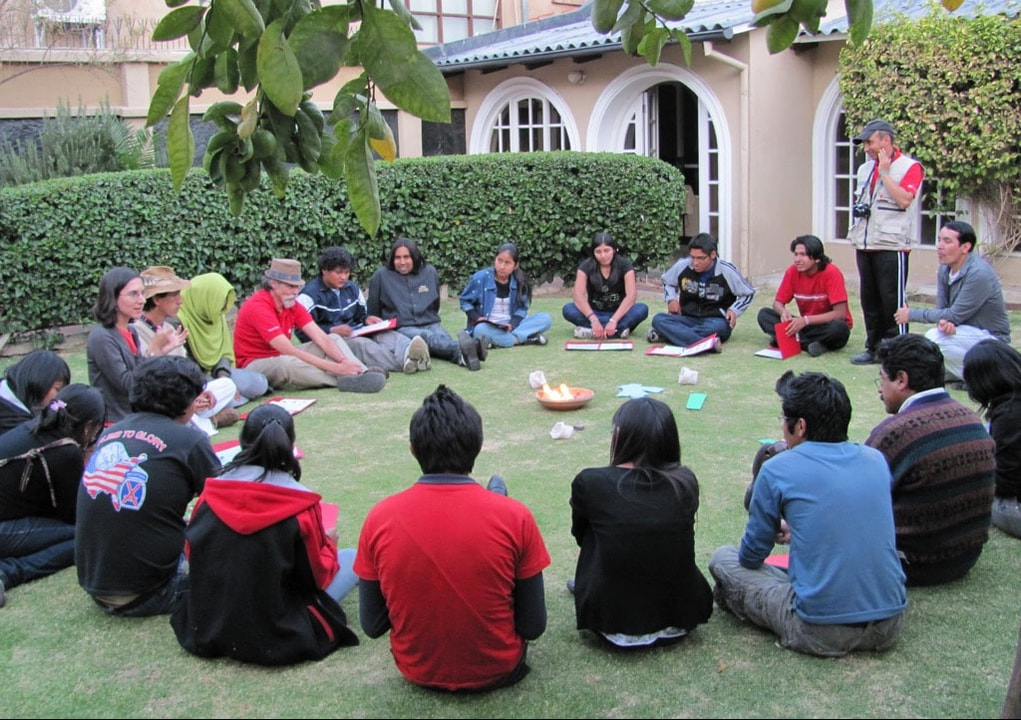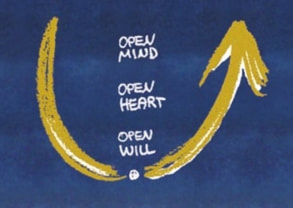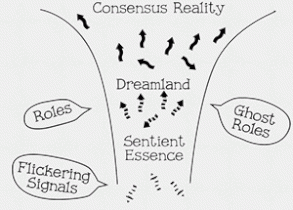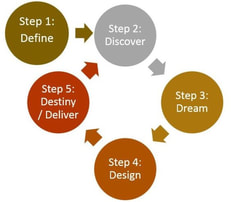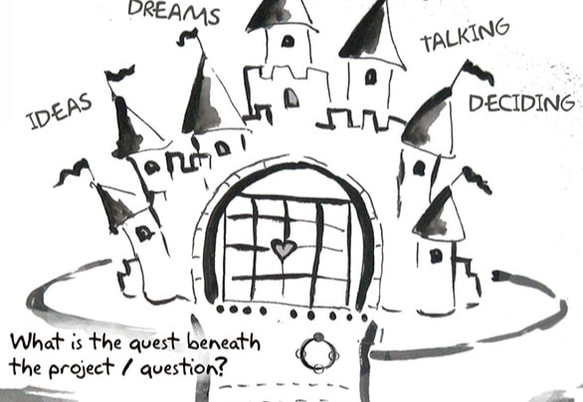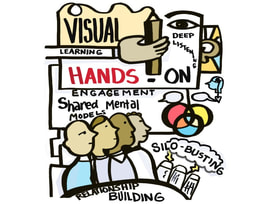Methods & Tools
We draw on a range of methods and tools to help your group have the kind of conversation that is needed.
Here are some of our go-to's. Learn more about our facilitation approach here.
Here are some of our go-to's. Learn more about our facilitation approach here.
Transformational StrategyTransformational Strategy, developed by the Institute for Cultural Affairs, is a participatory strategic planning process that goes beyond visioning to generate innovative strategies for success. It leaves teams with a sense of common purpose and commitment, and the practical action plans they need for immediate implementation.
|
Participatory AssessmentThe ToPTM Participatory Assessment considers the whole system and looks at all the issues. In a half-hour conversation or an hour and a half-long workshop with small or large groups, the imbalances in the system are surfaced and the organization's or community's key challenges identified. A foundation for program design.
|
Historical ScanWith the ToPTM Historical Scan, teams and organizations reflect on the past and celebrate accomplishments. It's a quick and effective way to bring new people up to speed, help everyone get to know each other, and learn from experience. It can serve as a qualitative evaluation and pave the way for envisioning the future. |
Open Space
|
Participatory Learning & ActionParticipatory Learning & Action approaches and methods empower people to share and analyse their knowledge of their lives and conditions, to plan and act on issues that affect them, and then to monitor, evaluate and reflect on the results. PLA participatory and visual tools--such as community mapping, historical timelines, flowcharts, force-field analysis, matrices of priorities, transect walks, and focus groups--are powerful tools for ensuring that people's voices shape plans and outcomes.
|
Results-Based Management (RBM)Results-based management tools--such as the logic model, theory of change, monitoring framework and risk register--can be powerful aids to participatory planning, analysis, monitoring and evaluation. When used by relevant stakeholders in a facilitated group process they support collective decision-making about the desired social change and how best to achieve and track it. They are especially relevant and grounded when paired with human rights-based analytical tools such as causal and stakeholder role and capacity analysis.
|
Systems Thinking ToolsSystems thinking tools help people reach a better understanding of the system they are trying to influence, so they can more effectively support the change they want to see. Tools for issues analysis, causal analysis and actor/stakeholder mapping help groups to explore inter-relationships, to include multiple perspectives, and to be clear about the scope, scale and type of change they want to make. Seeing the big picture makes it easier to identify leverage points for change, and to see what joined-up actions would really make a difference.
|
Collective ImpactCollective Impact is a structured form of cross-sector collaboration in service of meaningful, sustainable progress on a social issue. Participating stakeholders develop a common agenda (and community aspiration), agree on shared measurement of progress, undertake mutually reinforcing activities, and communicate over a long period, supported by a "backbone" organization or container. Collective impact offers a useful framework and a wealth of tools for systems and policy change with community engagement.
|
Partnership BrokeringPartnership brokering is about supporting and strengthening multi-stakeholder partnerships so they can lead to sustainable change and impact. To support collaborative processes, a partnership broker brings innovative approaches, knowledge of what is needed at each stage of the partnership cycle, and a set of skills--from facilitation and negotiation to record-keeping and coaching. A skilled broker can make all the difference to the effectiveness of partnerships, networks, alliances and consortia, both "serving" and "leading" as required.
|
Focused conversationsThe Focused Conversation Method, developed by the Institute of Cultural Affairs, provides a safe structure for conversation on any topic, even difficult ones. It allows for a full yet focused exploration of the topic. It helps groups clarify differences and reach agreement and can be applied to all types of work in groups. It takes people through four levels of questions, based on the theory that people need to review the actual data and surface their emotional responses to generate grounded options and ultimately come to sound decisions.
|
World CaféIn a café setting, any number of small groups of 4-5 people talk together around tables. The focus is a question that matters to them or work they want to do together. After each conversation, someone stays at the table as "host," while the others move to a new table, bringing their previous conversations with them. This allows the threads of the various conversations to weave together so that a global sense what the group is learning and creating emerges. World Café is a great way to uncover what a group is thinking or feeling on a topic.
|
Consensus WorshopThe Consensus Workshop Method, developed by the Institute of Cultural Affairs, supports diverse groups to listen to each other, generate and build on each other's ideas, and reach a well-considered and nuanced consensus with which the group can move forward. It involves five simple steps: Context, Brainstorm, Cluster, Name, and Resolve. Though simple, it is a powerful tool for groups to learn from each other and create solutions for themselves in even the most complex, multi-faceted and ambiguous situations.
|
Circle processIn a circle, everyone is a leader, and everyone can see and hear each other. Circle process creates a container that supports speaking with intention and listening with attention. It allows for each speaker the space to pause, listen for what the moment is calling for, and be surprised by what they hear themselves say. "Check-in" circles help people get to know each other and the issue in question; "check-out" circles allow for review and closure. Anywhere in between, circle process can support deep reflection, collective wisdom, and emergent consensus.
|
Theory UTheory U, developed at MIT by Otto Scharmer, is a framework with a set of tools for leading from the future as it emerges. It maps how to tap into our collective creativity to address the root causes of current challenges and innovate the better world that wants to be born. In the U process, individuals and groups move through an awareness-based whole system journey in five movements--from common intention, to observation, through connecting to source for inspiration, prototyping the new, and enacting new systems.
|
Deep DemocracyDeep Democracy, based on the work of Arnie Mindell and colleagues at the Process Work Institute, offers a method and framework for harnessing the power of groups. It invites in the invisible and marginalized voices where transformative potential often lies. Awareness-based, it equips the facilitator with micro-skills and inner work tools for supporting collective change. It allows for deep conversations, and is useful for processing conflict, exploring underlying tensions, finding a common purpose, or strengthening teams.
|
Appreciative InquiryAt its core, Appreciative Inquiry is about searching for the best in people, teams, organizations and their contexts. Rather than setting out to solve a problem, it is about building on assets. It offers a process model for change at all levels--from the individual to the organization to the system: the 5 Ds. 1) Define the topic of inquiry; 2) Discover the best of "what is;" 3) Dream "what could be;" 4) Design "what should be;" and 5) Deliver "what will be." Developed by David Cooperrider and colleagues, its use has spanned the globe.
|
Pro-Action CaféThe Pro Action Cafe is a space for creative and action oriented dialogue where participants host conversations about their project, ideas, questions or whatever they need help to manifest in the world. The conversations interlink and build on each other, creating cross-pollination and synergies. It can be used by a network or as a way for any group to generate new insights and collaborate on design for wiser action informed by the collective. A blend of “world cafe” and “open space," it was first conceived by Rainer von Leoprechting and Ria Baeck.
|
Graphic RecordingGraphic recording and graphic facilitation involve using text and images to capture what is being said live during a meeting. Visual representation brings a deeper level of listening and participation, bridges linguistic barriers and learning styles, and encourages big picture thinking. It makes concepts easier to understand and engages both heart and mind. It also boosts retention of information, and provides an artful and evocative record of the event that can be shared afterward with participants and the larger system.
|
